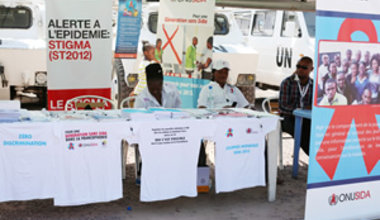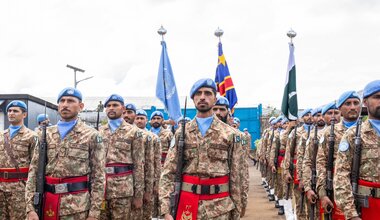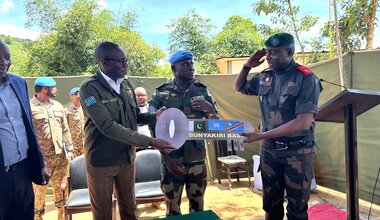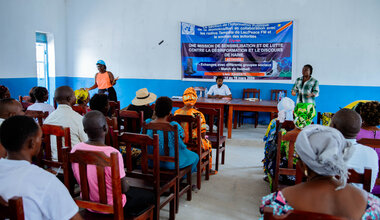Sensitization of UN Staff and dependents on the Virus Ebola and HIV/AIDS

Kinshasa, 2 November 2014 – MONUSCO GHANBATT/Cotex site was chosen to host UN CARES activities aimed to reduce HIV/AIDs in the UN work environment, in support of the universal access to a range of advantages including prevention, cares and support to the entire UN staff and their families.
Over 250 young children, teenagers and parents, in convivial mood and in a bright sunshine, met at MONUSCO GHANBATT/Cotex, to respond to the invitation of the United Nations system and MONUSCO on the occasion of the sensitization activity for their staff and dependants on the virus Ebola and HIV/AIDs known as UN CARES. In attendance, a number of distinguished guests including the UN Resident Coordinator in charge of the Humanitarian Actions, Moustapha Soumaré, the country Coordinator of the UN AIDS and other chiefs of Agencies.
After the anthems of the Democratic Republic of Congo and of the United Nations were ably performed by the Ghanaean batallion to open the solemn event, the head of the staff association FUNSU, Mr. Kitenge took the floor to explain the context of the day: « We, the staff of the United Nations, basically work for other people, in high risk situations, often forgetting about ourselves; UN CARES was created to enable us to mark a pause and think about ourselves and our families, in relation to HIV/AIDS and now the virus Ebola; we have chosen Sunday to help our spouses, dependants and children to take part in this activity organised once a year.».
Then, Mr. Moustapha Soumaré urged the United Nations staff to reflect on what they should do to protect their families from HIV/AIDS and the EBOLA virus. « We must convey the necessary and relevant information to our families to avert a situation whereby a shoemaker is putting the bad shoes for himself, » he said.
Precious information were given to the audience by the WHO doctors backed by the Resident Representative of the same organisation, Dr. Joseph CABERE: The Ebola virus in the DRC is mainly confined to the Equateur province, more precisely in the Boende Health Zone, territory of Djera. Altogether, 65 cases were reported, among which 49 dead; the last case of death from the virus was reported on 4 Octobre 2014. Preventive measures were recommanded including hands washing by applying the following steps: using soap, doing friction (on the palms of hands, in-between and all along the fingers, inside the nails), drying hands with single use towels; burial of the persons infected with the Ebola virus must be secured by specialised medical staff.
 ONU
ONU Nations Unies Maintien de la paix
Nations Unies Maintien de la paix




